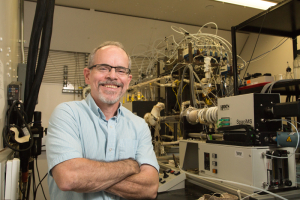Mike Harold, M.D. Anderson Professor and chairman of the chemical and biomolecular engineering department at UH Cullen College of Engineering, recently won the 2019 Southwest Catalysis Society (SWCS) Award for Excellence in Applied Catalysis.
“We were impressed by your tremendous contributions in emission control catalysis and fuel processing,” wrote Lin Luo, chairman of the SWCS Award Selection Committee, in his notification email to Harold. “We believe you set a role model for the Society to demonstrate how to apply scientific methodology to real world problems and achieve high impact on the development of new generation catalysts.”
Harold, who is an expert in catalytic reaction engineering, has spent much of his 34-year-career working to improve air quality in Houston and beyond.
As founding director and principal investigator of the Texas Center for Clean Engines, Emissions and Fuels (TxCEF), Harold has helped develop technologies to reduce harmful vehicle emissions, performed testing and verification on emission-reducing technologies developed by outside groups, and worked to improve fuel economy for medium- and heavy-duty vehicles.
Most recently, he is leading a team of researchers chosen by the U.S. Department of Energy on a $2 million project to develop and optimize a lower-cost, more efficient catalyst for natural gas vehicles to eliminate unreacted methane.
“Specific to research, I think probably the advancement of new types of catalytic converters for vehicles is the thing I’m most proud of,” said Harold, adding that there is a certain satisfaction in knowing “the advances you’re making will benefit health by reducing pollution. Sounds kind of apple pie and motherhood and that kind of thing, but it is fulfilling to know you are making an impact.”
But Harold said the most rewarding aspect of his career is working with students. “Some of these problems are pretty challenging, but the students that I have had have been very good,” he said. "Reflecting on where my former students are now…many are still working in emission control. You know you’re making a difference when you see groups of students doing well in companies that are really needing to put all this knowledge and development into practice.”
He credited the University, Cullen College and specifically his department for contributing to his productivity. “I’m surrounded by outstanding people and collaborators,” Harold said. “It’s a nurturing environment, but also a challenging environment. All of us professors have very high goals as a group and that kind of lifts everyone up.”
Harold added that being a professor in chemical engineering in Houston and the Gulf Coast where energy is king and the chemical industry is thriving has definite perks. “It really helps the students see how their work is making a difference by interacting with these collaborators from industry,” he said. “Plus the proximity allows us to bring in more real world issues and problems into the classrooms.”
He earned his doctorate in chemical engineering from the Cullen College in 1985, studying under the guidance of his now-colleague Dan Luss. After graduating, Harold took a faculty position at the University of Massachusetts at Amherst, where he became a tenured associate professor. However, he wanted to solve real-world problems and took a R&D position with the DuPont Company.
In the late 1990s, the company began to move away from chemical conversions. Around that time, Harold was approached by the Cullen College about the recently opened chairman position in the department of chemical and biomolecular engineering. He returned to UH in 2000.
Past accolades include being elected a fellow of the American Institute of Chemical Engineers (AIChE) on 2014 as well as the University’s most prestigious faculty honor – the Esther Farfel Award in 2013 among numerous other research and teaching awards.
Harold’s most recent award will be presented at the 2019 SWCS Spring Symposium at the UH Alumni Center on Friday, April 26.
